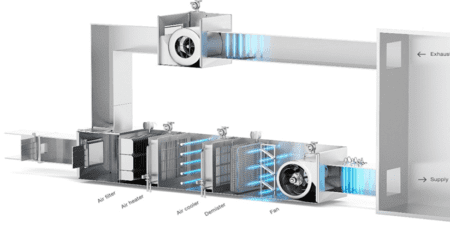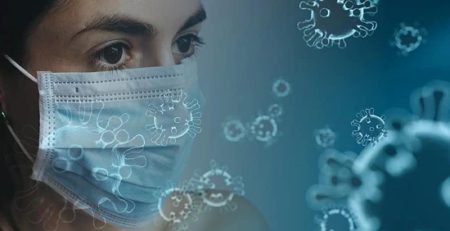The rapid creation of the vaccines against COVID-19 are historic achievements which undoubtedly rank among the greatest scientific and medical breakthroughs of the modern age.
However, as the leaders of health authorities around the world agree, the availability of vaccines will not end the coronavirus pandemic alone. Instead, we must fight the virus on multiple levels: vaccination, medical therapy, clean air and improved hygiene.
The news this week, of a new variant of COVID-19 being detected in the UK, demonstrates one of the crucial reasons why we cannot rely totally on a vaccine – or vaccines – to bring an end to this pandemic.
A new strain of COVID-19
This week, Health Secretary Matt Hancock revealed that a new variant of COVID-19 has been identified in the UK, warning that it could be linked with the rapid spread of the virus in south-east England:
“Over the last few days, thanks to our world-class genomic capability in the UK, we have identified a new variant of coronavirus which may be associated with the fastest spread of the virus in the south-east of England.
“Initial analysis suggests that this variant is growing faster than the existing variance. We’ve currently identified over 1,000 cases with this variant, predominantly in the south of England, although cases have been identified in nearly 60 different local authority areas and numbers are increasing rapidly.”
Although Mr Hancock stressed that it is “highly unlikely” a vaccine would not work against the new variant, it is a real possibility that this may not be the case for this or future variants of the disease.
What this means for the fight against coronavirus
The government has reported the findings to the World Health Organisation and scientists are looking into the new strain at Dstl Porton Down – the government laboratory where PP-L’s Chief Medical and Scientific Officer, Dr Rhys Thomas trained before working on the NHS frontline treating COVID-19 patients, including patients with the new strain of COVID-19.
Alongside his work with the NHS, Dr Thomas provides his medical and scientific expertise to help PP-L Health Technology support organisations across the UK to reduce the risk of viral transmission through their activities.
Dr Thomas explains what this means for the fight against the virus:
“All viruses mutate and mutations are more likely to occur when a virus is widespread. Right now, there are around 700,000 new cases of COVID-19 being reported each day around the world and with many many more likely to be going undetected. With the virus this prolific, it’s inevitable for new strains to emerge which behave slightly differently to the dominant strain we’ve seen so far.
“Sometimes, these mutations may cause different symptoms in people who are infected, it might alter how the virus can be transmitted, or change how successfully it can reproduce inside the human body.
“There is also a slight chance that the virus might mutate in such a way which means people may be susceptible to the new strain even if they have become immune to the dominant strain of COVID-19, either by recovering from the virus or by vaccination. Unfortunately, all 53 vaccines which are either in use or are still in development, target this one variant of the virus; the danger is that if it changes enough, all of these will be done for.”
No “magic bullet”
While recent media reports and politicians have, rightly, praised the development of the vaccines, health experts have made it clear over many months that the benefits of a vaccine are limited.
“Even if we do have a vaccine, it won’t end the pandemic on its own. We must all learn to control and manage this virus using the Tools we have now”
- World Health Organisation Director-General, Tedros Adhanom Ghebreyesus, August 2020
“The idea that a vaccine will end the pandemic just isn’t realistic. That’s not going to happen”
- Barry Bloom, PhD, an expert in infectious diseases and immunology at the Harvard T.H. Chan School of Public Health
“I think it’s unlikely that we will end up with a truly sterilising vaccine – i.e. something that completely stops infection – and it’s likely that the disease will circulate and be endemic…That’s my best assessment and I think that’s the view of many people on SAGE that that’s a likely outcome. Clearly, as management becomes better, as you get vaccination which will decrease the chance of infection and the severity of disease, or whatever the profile of the vaccines are, this then starts to look more like annual flu than anything else. That may be the direction we end up going in.”
- Sir Patrick Vallance, October 2020
“This infection is not going away, it’s now a human endemic infection. Even, actually, if we have a vaccine or very good treatments, humanity will still be living with this virus for very many, many years…. decades to come.”
- Wellcome Trust director and SAGE member, Prof Sir Jeremy Farrar, July 2020
Why vaccination cannot succeed alone
Despite vaccinations having been developed since the 18th century, to date, only two infectious diseases have been eradicated – smallpox and rinderpest, which infected cattle. Polio has almost been eradicated and it’s hoped that it can be made extinct within years.
Many diseases can be contained through widespread vaccination programmes, but COVID-19 and other coronaviruses are very difficult to control in this way.
Dr Thomas explains why this is so difficult, and why other measures much also be embraced if we’re to meaningfully reduce the risk posed by the virus:
“On top of their tendency to mutate, coronaviruses present another problem because, unlike other contagious diseases such as polio, measles or tuberculosis, the body isn’t as capable of developing long term memory to them. This is why you can keep on catching the common cold and why flu vaccines are given seasonally.
“Unfortunately, even though a COVID-19 vaccine might protect you from the virus for a few months, we can’t be confident that it will offer long term protection. The same is true if you’ve already had COVID-19; you might be immune for a few months, but you’ll probably be able to catch it again as your body forgets how to fight it.
“Combined with the probability of mutations, this means that although vaccinations can be helpful and they might help to reduce transmission in the short term, we must fight this virus on multiple fronts if we’re to control this virus in the long term.
“To truly get this virus under control and reduce the risk it poses so we can move forward, we have to improve medical therapy, improve hygiene and ensure we have clean air in all environments, as well as having ongoing, seasonal vaccination programmes similar to the way we combat flu.
“Generally, we need to get better at adapting to live as normally as we can while also preventing the spread of diseases because this will not be the last pandemic we will have to face. Ensuring clean air and clean environments is going to be crucial to this end, and this can be achieved with the aid of a few discrete and unobtrusive systems while also addressing issues such as pollution, poor air quality and overall public health and wellbeing.”
If you’d like to find out more about PP-L Health Technology Solutions and speak to our team, please contact us or find out more about our services.






Leave a Reply